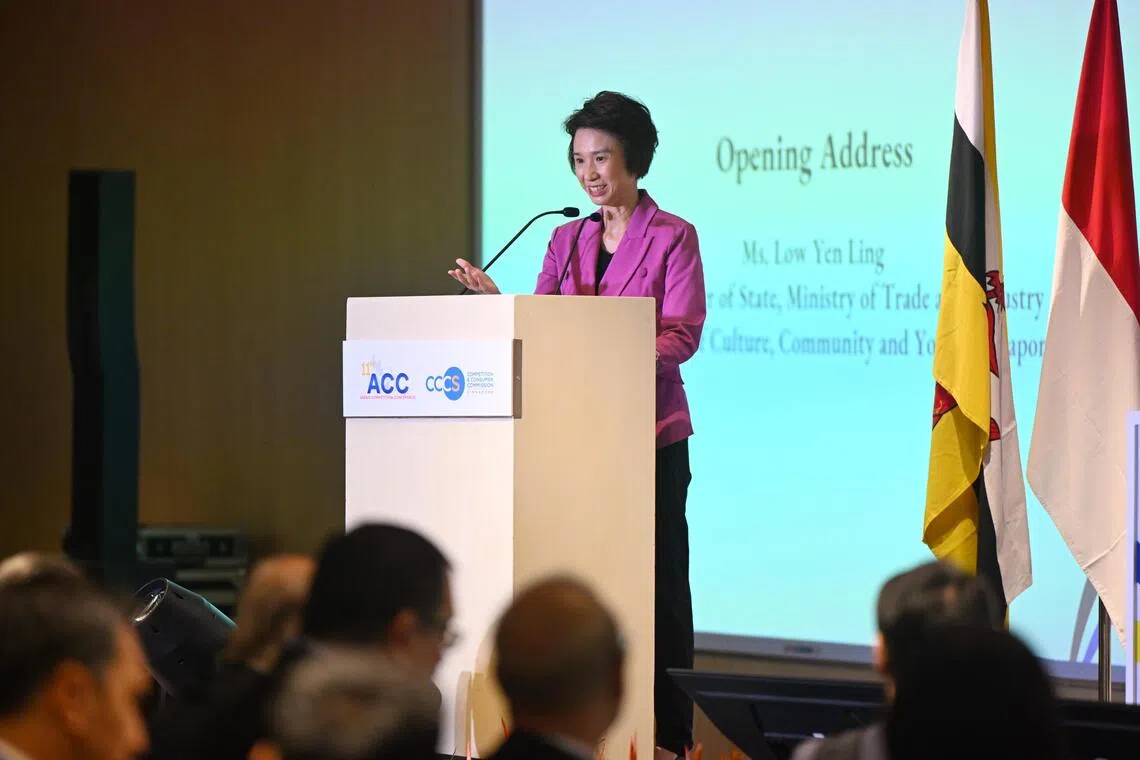Asean renews commitment to fair markets amid global disruption
Sign up now: Get ST's newsletters delivered to your inbox

Senior Minister of State for Trade and Industry Low Yen Ling said competition policies can promote market efficiency and business innovation, and keep prices affordable.
ST PHOTO: AZMI ATHNI
- Asean launches 2026-2030 plan to ensure fair markets by strengthening enforcement and improving cooperation against monopolistic activities.
- The plan addresses emerging areas like AI and sustainability.
- Asean strengthens competition frameworks in agreements with trading partners.
AI generated
SINGAPORE - The competition authorities of Asean have launched a five-year plan to ensure that businesses operating in the region have access to fair markets.
It includes directives to strengthen enforcement against monopolistic activities and improve cooperation on matters like information sharing.
Officials will also engage micro businesses, small and medium-sized enterprises, the judiciary and consumers on the benefits of competition.
In addition, they will look at ways to promote fair competition in emerging areas like artificial intelligence, sustainability and digital markets.
Mr Din Virak, an independent commissioner of the Cambodia Competition Commission, told a conference in Singapore on Sept 24 that the 2026-2030 plan was created for a world at a “critical inflection point”.
He added: “The global and regional economies are undergoing a shift driven by the aftershock of the pandemic, geopolitical uncertainty, digital transformation and the growing urgency for inclusive and sustainable growth.
“The changes demand that competition policies step beyond the traditional sphere and become an engine for setting the market for tomorrow.”
Cambodia is the current chair of the Asean Experts Group on Competition (AEGC), comprising representatives overseeing competition policy and law from member states.
Senior Minister of State for Trade and Industry Low Yen Ling said competition policies can promote market efficiency and business innovation, as well as keep prices affordable.
She pointed to a 2022 Organisation for Economic Cooperation and Development report, which cited studies showing that increased competition can lead to lower inflation.
She added: “When competition and markets function effectively, businesses are incentivised to operate more efficiently. As a result, consumers benefit from competitive prices that help keep daily expenses manageable, especially essential goods and services.”
Asean has long recognised the importance of competition, Ms Low said. The 10-nation grouping established the AEGC almost two decades ago, and has worked to help markets function well under competition.
On Sept 22, the group inked a formal agreement on competition at the 57th Asean Economic Ministers’ Meeting in Kuala Lumpur.
The pact seeks to boost the capacity of member states to address anti-competitive activities, and build on existing competition provisions in agreements like the Regional Comprehensive Economic Partnership.
Asean has also recently strengthened competition frameworks in agreements with trading partners including China. It is also currently engaged in negotiations with Canada.
The conference in Singapore gathered policymakers, business leaders, practitioners and academics to discuss the latest competition policy developments in the region.
The AI industry is the target of a new voluntary self-assessment tool, which will be released by the Competition and Consumer Commission of Singapore. It was developed in collaboration with the Republic’s Infocomm Media Development Authority.
The tool will help firms determine if their models and practices are compliant with competition regulations.
Ms Low said: “Businesses will be better equipped to identify potential competition and consumer protection issues early.
“This minimises their risks of engaging in anti-competitive or unfair trade practices.”


